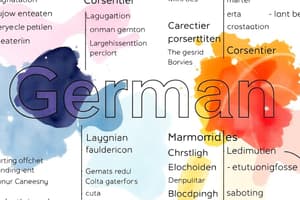Podcast
Questions and Answers
Which of the following statements accurately reflects the grammatical structure of German?
Which of the following statements accurately reflects the grammatical structure of German?
- German inflection affects words based on their grammatical role in a sentence. (correct)
- German has a simple grammatical structure with minimal inflection.
- German verbs do not change based on tense or person.
- German lacks a system of noun cases.
What is the official status of the German language?
What is the official status of the German language?
- Only used informally across Central Europe.
- Not recognized as an official language anywhere.
- Official in several countries including Germany and Switzerland. (correct)
- Official only in Germany.
Which feature of German vocabulary is notable?
Which feature of German vocabulary is notable?
- German vocabulary has minimal historical influences.
- German uses no prefixes or suffixes to form new words.
- German vocabulary is entirely unique with no borrowed words.
- German vocabulary is heavily influenced by Latin and Greek. (correct)
In which way does German grammar differ from English grammar with respect to word order?
In which way does German grammar differ from English grammar with respect to word order?
Which of the following is a notable aspect of the German dialects?
Which of the following is a notable aspect of the German dialects?
What is emphasized in German culture that may reflect language tendencies?
What is emphasized in German culture that may reflect language tendencies?
How does knowledge of Latin and Romance languages assist in learning German?
How does knowledge of Latin and Romance languages assist in learning German?
Which aspect of German writing is noted for its uniqueness?
Which aspect of German writing is noted for its uniqueness?
Flashcards
German Language Family
German Language Family
German belongs to the Indo-European language family, specifically the West Germanic branch.
German Grammar
German Grammar
Highly inflective, meaning words change based on their role, gender, number, and tense.
German Noun Cases
German Noun Cases
A complex system with different cases (nominative, accusative, dative, genitive) affecting noun usage.
German Verb Conjugations
German Verb Conjugations
Signup and view all the flashcards
German Vocabulary and Roots
German Vocabulary and Roots
Signup and view all the flashcards
German Dialects
German Dialects
Signup and view all the flashcards
Standard German
Standard German
Signup and view all the flashcards
Formal German "Sie"
Formal German "Sie"
Signup and view all the flashcards
Study Notes
German Language Overview
- German is a West Germanic language, native to Central Europe.
- It is the most widely spoken Germanic language.
- It's an official language in Germany, Austria, Switzerland, Liechtenstein, and parts of Belgium and Italy.
- It's widely used in academia and business across Europe.
- German belongs to the Indo-European language family.
Grammar Overview
- German grammar is highly inflective, meaning words change form considerably depending on their grammatical role in a sentence (case, gender, number, tense).
- Four grammatical genders exist (masculine, feminine, neuter, and common).
- German uses a complex system of noun cases (nominative, accusative, dative, genitive).
- Verb conjugations are extensive, reflecting tense, mood, person, and number.
- Word order in German sentences is relatively flexible compared to English, but verb placement is essential for meaning.
Vocabulary
- German vocabulary has a strong connection to other Germanic languages, like English, Dutch, and Scandinavian languages.
- Borrowed words from Latin and Greek are also prevalent.
- German uses prefixes and suffixes extensively to form new words.
- The vocabulary reflects historical influences, particularly from Latin and Greek.
Dialects
- German has many dialects, each with its own grammar.
- Dialect differences can be considerable with different pronunciations as well as vocabulary.
- Standard German is the standardized form used for official communication.
- These dialects can greatly impact understanding between speakers from different geographical areas.
Writing System
- German utilizes a Latin-script alphabet.
- Like most Western European languages, these letters are used.
- Spelling is relatively consistent, although some irregularities exist.
Culture and Usage
- German is a language central to German culture and heritage, reflected in literature, philosophy, and music.
- German culture emphasizes precision, organization, and a strong work ethic, possibly influencing language tendencies.
- A formal register is often used in professional and official communication.
- The use of formal "Sie" (you, formal) when addressing someone you don't know well reflects an important aspect of German social etiquette.
Learning German
- Knowing Latin and Romance languages might provide a helpful starting point in terms of vocabulary.
- Learning grammatical structures can be challenging due to the complexity of case systems and verb conjugations.
- Immersion techniques and practice are crucial for effective learning.
Studying That Suits You
Use AI to generate personalized quizzes and flashcards to suit your learning preferences.




